Paapanaasam Raamayya Sivan was an Indian composer of Carnatic music and a singer. He was awarded the Madras Music Academy's Sangeetha Kalanidhi in 1971. He was also a film score composer in Kannada cinema as well as Tamil cinema in the 1930s and 1940s.

Central Studios was an Indian film studio in the neighbourhood of Singanallur, Coimbatore in Tamil Nadu, started by B.Rangaswamy Naidu and other prominent industrialists like Swamikannu Vincent of Coimbatore in 1935 to make Tamil and other South Indian language movies. The studio was a major hub of Tamil movie production and notable for its association with many early day Tamil Movie Superstars, directors and script writers etc. and many making their career debuts here. The studio is best remembered for movies like Sivakavi, Velaikari and Haridas.

Mayavaram Krishnasamy Thiyagaraja Bhagavathar, also known by his initials as M. K. T. & Super star of Tamil cinema was an Indian actor and carnatic singer. Critics and film historians acknowledge Bhagavathar as the first superstar of Tamil cinema. Bhagavathar was born in the town of Mayiladuthurai in then-Tanjore district of the Madras Presidency, British India. He started his career as a classical singer and stage artist in the late 1920s. In 1934, he made his debut in films with the movie Pavalakkodi which turned out to be a hit.

Haridas is a 1944 Tamil language film directed by Sundar Rao Nadkarni and starring M. K. Thyagaraja Bhagavathar, T. R. Rajakumari and N. C. Vasanthakokilam.

Sri Murugan is a 1946 Indian Tamil-language film produced by Jupiter Pictures and directed by M. Somasundaram and V. S. Narayanan. The film featured Honnappa Bhagavathar in the lead role. M. G. Ramachandran performed a dance number, Shiva Thandavam along with K. Malathi in the film.

Dhaasippen, also Dhaasippenn is a 1943 Tamil-language film directed by Ellis R. Dungan and produced by Bhuvaneswai Pictures. The lead actors are T. R. Mahalingam and M. G. Ramachandran. The film was scored by Lalitha Venkatraman and S. Rajeswara Rao. The film has had three other titles: Jyothi Malar, Dasi Penn and Thumbai Mahatmyam, and Jothi Malar. The film is based on a folk tale about a girl becoming a devadasi and dedicating her life to worshipping Lord Shiva and refusing to follow the traditional path of marrying a man. Dhaasippen performed well and became a box office hit. But no print of the film is known to survive, making it a lost film.
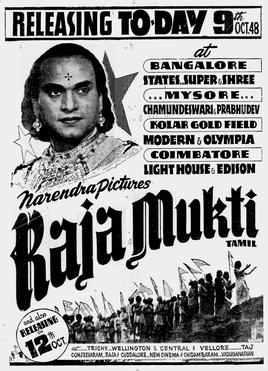
Raja Mukthi is a 1948 Indian Tamil language film starring M. K. Thyagaraja Bhagavathar, V. N. Janaki and P. Bhanumathi. M. G. Ramachandran had done a supporting role. The film was released on 9 October 1948.

Pavalakkodi is a 1934 Tamil language film starring M. K. Thyagaraja Bhagavathar and directed by K. Subramanyam. It was the first film for both of them. The film's music was composed by Papanasam Sivan.

Chintamani is a 1937 Indian Tamil-language film directed by Y. V. Rao starring M. K. Thyagaraja Bhagavathar, Serugulathur Sama and Aswathamma. It was the first Tamil film to run for a year in a single theatre.
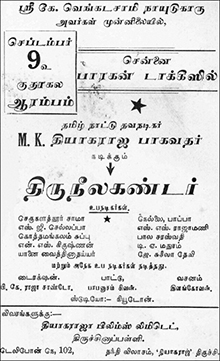
Thiruneelakantar is a 1939 Indian Tamil-language film directed by Raja Sandow and starring M. K. Thyagaraja Bhagavathar. The film, based on the life of Tirunilakanta Nayanar, was a big hit and was known for Thyagaraja Bhagavathar's acting apart from his songs. The noted nadaswaram player T. N. Rajarathinam Pillai makes a guest appearance.
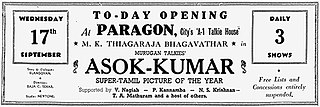
Ashok Kumar is a 1941 Indian Tamil-language historical drama film directed by Raja Chandrasekhar. Based on a legend involving the Mauryan emperor Ashoka The Great, his son Kunala and Ashoka's second wife Thishyarakshai, it stars M. K. Thyagaraja Bhagavathar, Chittoor V. Nagayya and P. Kannamba. The film was released on 17 September 1941.
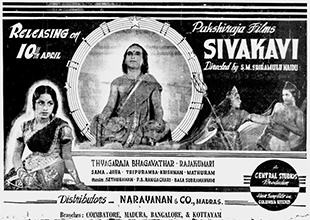
Sivakavi is a 1943 Indian Tamil-language film directed, initially, by P. K. Raja Sandow and later, S. M. Sriramulu Naidu. It starred M. K. Thyagaraja Bhagavathar, S. Jayalakshmi, Serukalathur Sama, Thirupurambal, T. R. Rajakumari, N. S. Krishnan and T. A. Mathuram. The film's screenplay was written by Thiru Muruga Kirubanandha Variyar. The film was shot at Central Studios and released by Pakshiraja Films in Coimbatore. The film was released on 10 April 1943.
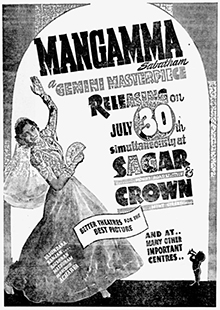
Mangamma Sabatham is a 1943 Indian Tamil-language film, starring Vasundhara Devi, Ranjan, N. S. Krishnan and T. A. Mathuram. The film was produced by S. S. Vasan and directed by T. G. Raghavachari, credited as Acharya. The film was remade in Hindi and Telugu as Mangala and again in Telugu as Mangamma Sapatham (1965).

Sakuntalai is a 1940 Indian Tamil-language film directed by Ellis R. Dungan and starring M. S. Subbulakshmi and G. N. Balasubramaniam.
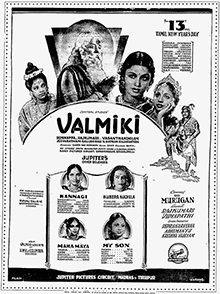
Valmiki is a 1946 Tamil-language film starring Honnappa Bhagavathar, U. R. Jeevarathinam, N. C. Vasanthakokilam, T. R. Rajakumari and T. S. Balaiah. It was directed by Sundar Rao Nadkarni.
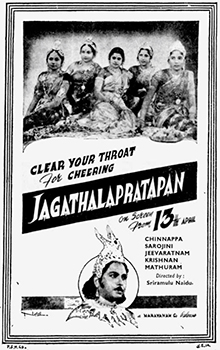
Jagathalapratapan is a 1944 Indian Tamil-language film starring P. U. Chinnappa and M. S. Sarojini. A film adaptation of a folk tale "12 Minister's Tale", the film also features P. B. Rangachari, M. R. Santhanalakshmi and N. S. Krishnan playing supporting roles. The film revolves around the theme of a prince who through his talents wins over several girls and marries them. The film was released on 13 April 1944 and became a box-office success and established Chinnappa as one of the top stars in Tamil cinema.
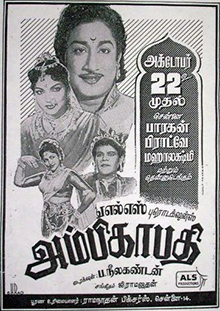
Ambikapathy is a 1957 Indian Tamil language film directed by P. Neelakantan, starring Sivaji Ganesan and P. Bhanumathi. The film, primarily in black-and-white, had sequences in Gevacolor. It was released on 22 October 1957.

Pankajavalli is a 1947 Indian Tamil-language film written, produced and directed by S. Soundararajan. The music was by Papanasam Sivan. The film starred P. U. Chinnappa, T. R. Rajakumari and Kumari Rukmani. The film was basically the story of Alli, who dominates men in her kingdom and treats them like slaves. The film was inspired by the popular Kerala folktale Malayala Pankajavalli, which Ayyangar adapted.
Aaravalli Sooravalli is a 1946 Indian, Tamil language film directed by C. V. Raman. The film stars K. Thavamani Devi, V. A. Chellappa, P. S. Govinda, M. R. Santhanalakshmi and Serukulathur Sama.

Naveena Sarangadhara is a 1936 Tamil film directed by K. Subramaniam under Murugan Talkies. Naveena in Tamil means modern. The film was titled thus in order to distinguish itself from the earlier versions and also in order to highlight the slight modifications made to the original story. The cast includes M. K. Thyagaraja Bhagavathar and S. D. Subbulakshmi in the lead roles supported by S. S. Mani Bhagavathar, G. Pattu Iyer and Indubala. The music was composed by Papanasam Sivan.



















